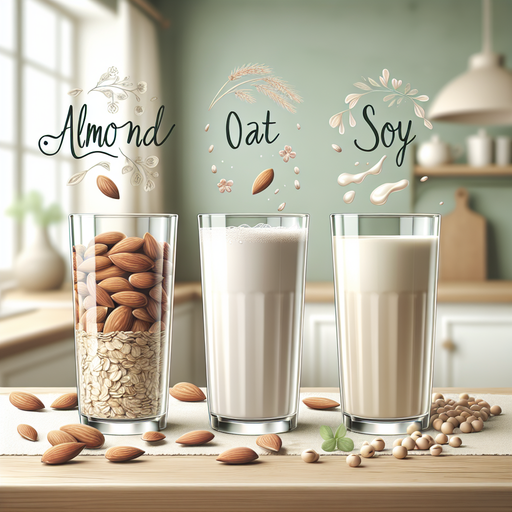Introduction:
Welcome to the world of plant-based milk! With the rise in vegan and dairy-free diets, the demand for alternative milk options has also increased. But with so many options available, it can be overwhelming to choose the best one for your needs. In this article, we will explore the most popular plant milk options and help you decide which one is the best for you.
Almond Milk:
Almond milk has gained popularity in recent years due to its creamy texture and nutty flavor. Made from ground almonds and water, this plant milk is a great source of vitamin E, calcium, and healthy fats. It also has a low calorie count, making it a popular choice for those looking to lose weight.
However, almond milk has a low protein content compared to cow's milk, which may not be suitable for those looking for a high protein alternative. It also has a slightly watery consistency, which may not appeal to some individuals. Additionally, almond milk may not be suitable for those with nut allergies.
Soy Milk:
Soy milk has been around for a long time and is a popular choice for those looking for a dairy-free option. Made from soybeans and water, it is a good source of protein and contains all nine essential amino acids. It also has a similar protein content to cow's milk, making it a suitable option for those looking for a high protein alternative.
Soy milk also has a creamy texture and a mild, slightly sweet taste. It is also a good source of calcium and vitamin D. However, some people may not enjoy the taste of soy milk, and it may not be suitable for those with soy allergies.
Oat Milk:
Oat milk has gained popularity in recent years due to its creamy texture and slightly sweet taste. Made from oats and water, it is a good source of fiber and contains beta-glucans, which have been linked to lowering cholesterol levels. It is also a good source of vitamin D and calcium, making it a suitable option for those looking for a dairy-free milk alternative.
Oat milk has a similar calorie count to cow's milk, but it has a lower protein content. It also contains gluten, making it unsuitable for those with gluten intolerance. Additionally, oat milk may not be as readily available as other plant milk options.
Coconut Milk:
Coconut milk is made from the grated flesh of mature coconuts and is a popular choice for those looking for a creamy and flavorful milk alternative. It has a high-fat content, making it a good source of healthy fats. It is also rich in vitamins C, E, and B, as well as minerals like iron, magnesium, and potassium.
However, coconut milk has a high calorie count and may not be suitable for those looking to lose weight. It also has a distinct coconut flavor, which may not appeal to everyone. Additionally, some brands may contain added sugars, so it is important to read the label carefully.
Rice Milk:
Rice milk is made from milled rice and water and has a slightly sweet taste. It is a suitable option for those with allergies to nuts, soy, or gluten. It is also low in fat and has a similar calorie count to cow's milk.
However, rice milk has a low protein content, making it unsuitable for those looking for a high protein alternative. It also has a thin consistency, which may not be appealing to some individuals. Additionally, it may not be as readily available as other plant milk options.
Conclusion:
In conclusion, the best plant milk for you will depend on your personal preferences and dietary needs. Almond milk is a good option for those looking for a low-calorie milk alternative, while soy milk is a suitable choice for those looking for a high protein option. Oat milk is a good source of fiber and may help to lower cholesterol levels. Coconut milk is a flavorful and nutrient-rich option, and rice milk is a suitable choice for those with allergies.
It is important to read the label and choose a plant milk that is free from added sugars and other additives. It is also important to consider the environmental impact of your milk choice, as some plant milk options may have a larger carbon footprint than others.
Ultimately, the best plant milk is the one that fits your needs and tastes the best to you. Experiment with different options and find the one that works for you. Remember, there is no one-size-fits-all solution when it comes to plant milk, but with the variety of options available, there is sure to be one that suits your needs perfectly. So go ahead and enjoy your dairy-free milk!


